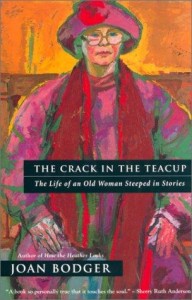November 27, 2011
True Stories: My Canada Reads Addendum
 CBC Canada Reads is tackling nonfiction for 2012, which got me thinking about true stories. One of the best things about lately barrelling through my unread books in author-alpha-order is that I’ve finally been driven to pick up the nonfiction I’ve been so long putting off, fiction always being what I turn to first. And so I finally read Christopher Dewdney’s Soul of the World, biographies of Elizabeth Bowen, Gertrude Bell and The Eaton Family. Nonfiction I’ve been compelled to read without prodding recently have been Maria Meindl’s Outside the Box, the biography of Virginia Lee Burton, Bring on the Books for Everybody, and Cinderella Ate My Daughter. So yes, there has been a lot of nonfiction to appreciate.
CBC Canada Reads is tackling nonfiction for 2012, which got me thinking about true stories. One of the best things about lately barrelling through my unread books in author-alpha-order is that I’ve finally been driven to pick up the nonfiction I’ve been so long putting off, fiction always being what I turn to first. And so I finally read Christopher Dewdney’s Soul of the World, biographies of Elizabeth Bowen, Gertrude Bell and The Eaton Family. Nonfiction I’ve been compelled to read without prodding recently have been Maria Meindl’s Outside the Box, the biography of Virginia Lee Burton, Bring on the Books for Everybody, and Cinderella Ate My Daughter. So yes, there has been a lot of nonfiction to appreciate.
But to show my true appreciation, and in the tradition of me reading alongside and offside what CBC folks are doing, I’m going to rereading a truly great Canadian nonfiction book this winter. It’s like Canada Reads Independently, but it’s one book, and a lot less trouble. I’m going to be rereading Joan Bodger’s memoir The Crack in the Teacup: The Life of a an Old Woman Steeped in Stories, and I’d love it if you could read along with me. If you’re following along with Canada Reads, I promise that your experience will be richer if you include this book along with the other five (and that it will blow the other five out of the water, no contest.)
From my blog post about the book: “Joan Bodger’s life was never, ever boring, from the grandmother who was killed in a shipwreck, to her unconventional girlhood as the daughter of a sailor, her stint in the army working as in decoding, the terrible sadness of her family life, what she learned about story and its power to transform children’s lives (and what I learned about Where the Wild Things Are in reading about this), her fascinating work in early childhood education, the loveliness of her second marriage, her shamelessness (which is learned, and earned with age), her honestly, her passion, that she placed her husband’s ashes in the foundations of the Lillian H. Smith Library which was then under construction.”






Oh my god, sold, sold, sold!
Thank you. I just re-read Pilgrim at Tinker Creek, blasted through The Year of Magical Thinking, and am about to read Mnemonic: a book of trees, by Theresa Kishkan.
I’m looking forward to A Book of Trees too! And glad to have some readers on board for Crack in the Tea Cup. It’s such a wonderful book.
Years ago, 1989, I lived for a winter in Utah with my family. I spent a lot of time at the public library with my children. I remember discovering How the Heather Looks. I rationed it out in the apartment we were renting that winter, yearning for the opportunity to do something similar: to ramble through England in search of the locations of so many of our favourite stories. I loved that book, loved the family at its heart. Many years later I found a copy in the library in Sechelt, a new edition with Joan Bodger’s Afterword detailing the way her life took a very different direction from the one I expected (and I’m sure from the one she anticipated). Yet her joy and curiosity infused that Afterward. The Crack in the Tea Cup is just as wonderful and I’ll follow this thread with interest!
I’ve recently become a devoted fan of this blog, and was immensely touched to read here the reminiscences about my late friend Joan Bodger. Joan’s enchanting book How The Heather Looks was my first introduction to her; when she moved to Toronto, we connected personally. In her later years she became a Jungian therapist, but struggled to pay the bills. She met this challenge by becoming a tour guide: she organized tours of Arthurian England, and led them with her stout walking staff and her great store of folklore and myths. I wrote about these tours several times in my Toronto Star column,m in an effort to drum up business for her…my favourite Joan anecdote about these trips was how she would take unwary schoolteachers and other trip followers to the source of the Kennet River and explain how the name derived from Cunt, the original name (according to her) for the wellspring source. Joan was intrepid. As she became older and less well, she moved to the west coast because she intended to walk out to sea when the right time came. I don’t know if she died that way, and have not been ready to ask our mutual friend Ken Setterington if that was how it was….he went out there to be with her at the end.
Her story was extraordinary. I’m so glad she still has worthy readers.
Thanks for your comment and for sharing your stories. I’ve noticed that she provokes a pretty passionate response from the readers she touches.